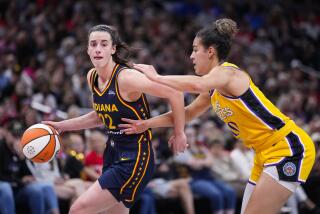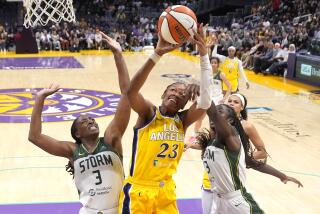Sparks Reach Out and Break New Ground
- Share via
Prospective fans, dozens of them, members of Girl Bar, a lesbian social club, lined up for autographs. They brought pennants, notebooks and basketballs to be signed by players from the Sparks. They grabbed free key chains and some signed up for season-ticket packages, which was the point.
No women’s sports team has ever partnered with a lesbian organization to attract fans. But Friday night the Sparks came to The Factory in West Hollywood to ask lesbians for support.
Good for the Sparks.
It is, says Sandy Sachs, a barrier to be broken, maybe the last barrier of prejudice to be broken in sports.
Sachs is co-founder of Girl Bar. A couple of months ago Penny Toler, the Sparks’ general manager, called Sachs and asked if she would be interested in pairing Girl Bar and the Sparks in marketing and promotions?
“To be honest,” Sachs said, “I was surprised.”
Sachs was surprised because women’s sports organizations and teams have tried to distance themselves from associations with lesbian groups.
With her business and life partner, Dr. Robin Gans, Sachs has, for several years, marketed a weekend package to the LPGA Nabisco Dinah Shore golf tournament in Rancho Mirage. “And the LPGA wants nothing to do with us,” Sachs said.
We shouldn’t be surprised. The Sparks are the first WNBA team to reach out to the lesbian community, but they shouldn’t be the last. And let’s understand something.
“This isn’t about marketing to sexual lifestyles,” Toler said. “It’s about marketing to a group of people we think will buy tickets.”
Historically there has been the perception that some women sports, such as golf and softball and even basketball, were dominated by lesbian athletes and fans.
As women’s sports have grown, as professional leagues have begun in women’s basketball, soccer and softball, those perceptions have met reality. All sorts of women play sports. All sorts of fans come to watch women’s sports.
Spark crowds are diverse. There are families--mom and dad bringing their sons and daughters. Boys and girls wear Lisa Leslie jerseys. There are boys and girls high school basketball players. There are lesbians too, and if you ask many of them, they’re often coming as families. It’s just that nobody before has bothered to make a sales pitch to them.
The Sparks have sat behind tables to sign autographs and chat with prospective fans at high school gyms, church basements, YMCA youth programs, boys and girls clubs, at malls and department stores, at amusement parks and grade schools. It is part of the job to encourage people who know nothing of your game to buy their first ticket or to give a nudge to people who do know your game to buy a second ticket.
Previously, there were no TV cameras to meet the Sparks. There were no debates on radio talk shows and no newspaper articles.
Until Friday night.
Friday night there were TV cameras and newspaper reporters. Friday afternoon the Sparks were talked about on radio talk shows. That seldom happens.
Was this a bad move by the Sparks? Would this send a signal to mothers to discourage their daughters from attending Spark games? Or was this courageous and innovative, pinpointing a group with disposable income and an interest in sports?
“We’ve gotten a couple of negative calls,” Spark President Johnny Buss said. “That’s too bad, but all we’re doing is adding to the marketing we’ve always done. We’ve reached the point now where we can be smarter about our marketing. We can target particular groups. Our market is girls age 12-14. It’s also these women.”
DeLisha Milton, a Spark player, was surprised that anybody would think it was special that the Sparks would be asking members of Girl Bar to buy tickets.
“We’re in Los Angeles which is one of the most diverse places in the world,” Milton said.
“We want everybody to come to our games. Blacks, whites, men, women, people who have alternative lifestyles. We’ve got plenty of room for anybody who wants to watch us play.”
Toler, who grew up in Washington, D.C., and was labeled a tomboy when she started playing basketball, said times have changed.
“Women’s sports have moved beyond the old stereotypes,” Toler said. “We don’t sell tickets for Section D, Rows 1-4 for black fans and Section C, Rows 1-4 for white fans and Section F, Rows 1-4 for lesbian fans. We just want fans. We’ve reached out to many different parts of this city looking for fans.”
Toler understands that there will be criticism. “Our society isn’t perfect,” she said.
Buss said he understands there are Spark fans with religious beliefs that tell them alternative lifestyles are wrong. Buss said this makes him sad and that he would want to tell those fans to be fair and come to the games and be part of the diversity.
And here’s a final thought for those who might feel this is wrong, that the Sparks should not send their players to meet with Girl Bar patrons on a Friday night.
How many basketball fans would ever have a problem taking their daughters and sons to Laker games? Say a Laker-Trail Blazer game? A game where Shawn Kemp plays? You know Kemp? He has fathered a number of children by a number of mothers. His season came to an early end when he entered a drug rehabilitation program.
The Staples Center seats are a lot cheaper for the Sparks. The players will happily sign your autographs and tell your daughters and sons about their college educations.
Most of all the Sparks are about basketball and reaching out to prospective fans so they can continue to play a game they love.
“If we want to keep getting paid to play basketball,” Milton said, “we’ve got to get fans. That’s what we’re doing. Getting fans to come to our games. That’s all.”
*
Diane Pucin can be reached at her e-mail address: diane.pucin@latimes.com.


